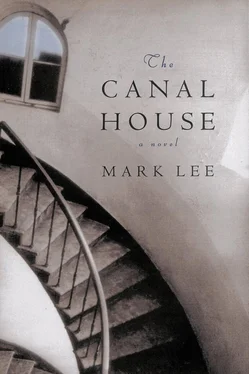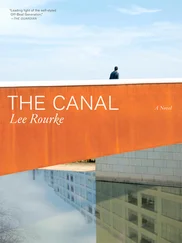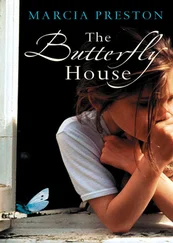“ Buon giorno, signora .” I smiled, but the old lady kept talking.
“She thinks that you slept on the ground last night and is afraid that this habit will give you tuberculosis. La Signora’s brother used to get drunk and sleep on the ground, and that’s how he died.”
“Tell her I’ll never do it again.”
La Signora accepted my apology and brought us a tray of food. She laid out two loaves of hard-crusted bread, a jar of blackberry jam, a bowl of black olives floating in brine with cloves of garlic, a basket of figs, a chunk of prosciutto, and some whitish yellow caciotta cheese.
I went into the house and washed my face and hands beneath the faucet at the kitchen sink. The water was cold and smelled faintly of limestone. I dried myself off and took a look around. The house had a flagstone floor and plaster walls. A propane refrigerator, stove, and water heater were in the kitchen, but there were no electric lights. Baskets hung from hooks in the ceiling and they were filled with garlic, onions, potatoes, dried red peppers. A photograph of the pope wearing a cowboy hat and chaps was taped to the wall over the sink.
The kitchen opened up to a living room with a stone fireplace that was big enough to cook a pig, a saggy couch, a leather easy chair, and a coffee table with stacks of old magazines and paperback books in several languages. One doorway led to the bathroom, which contained a toilet and a rusty bathtub. A second door led to Daniel’s bedroom where I saw shelves with music CDs and more books.
The farm wasn’t connected to a power line, and light came from candles and kerosene lanterns. Daniel’s laptop was on the coffee table along with a satellite phone and a short-wave radio. The house looked like a comfortable place to live, but something felt wrong. When I came out of the bathroom I realized that there wasn’t a single memento in the house. No Masai spears from Africa or silk prints from Thailand. No faded pictures of mom and dad in a sailboat or a snapshot from a ski trip to Austria. If Daniel McFarland had a personal life, it didn’t show.
But then I glanced into the bedroom and saw a framed photograph hanging on the wall over the dresser. Wrong again, I thought. Maybe it was a picture of the Contessa lying topless on the beach in Capri. Daniel was still outside, talking to the old lady. I slipped into the room, approached the photograph, and for a moment I stopped breathing.
It was a black-and-white photo of Daniel and Victor Zikowski in what looked like Bosnia. They were walking down a muddy road together. Knit caps. Heavy jackets. Someone must have said something funny or maybe they had just survived another confrontation with the Serb militia. Daniel was smiling and Victor’s mouth was open as he laughed.
Why had he placed this here? The photograph was probably the first thing Daniel saw when he woke up in the morning. Was this a guilty man’s daily penance, like a priest whipping himself for past sins? Or was it merely proof that another man was dead and he was lucky enough to survive?
I went back outside and sat at the table. “How you feeling?” Daniel asked.
“Slow.”
“Have some breakfast. La Signora always makes enough for five or six people.”
He put a plate in front of me and I started to eat. The sun was floating up from the horizon like a bright orange balloon but we were sheltered within the arbor. I mashed up some of the olives and made a sandwich. After my second cup of coffee and some prosciutto, I began to feel better.
That morning in the arbor, Daniel appeared more relaxed and less calculating. Bracciano was his home. While I ate breakfast he passed me dishes and went inside to find some butter.
“Carter Howard told me one thing about you,” Daniel said. “A couple of years ago you were covering a demonstration in Trafalgar Square. Then the police moved in and people started fighting.”
“Right. I was sitting on top of one of the bronze lions, taking pictures. And some kid started bashing me on the head with—”
“With a cricket bat?”
“Did Carter tell you that?” I smiled. “It was just a piece of plywood that was used to make a protest sign.”
“But you didn’t do anything? You didn’t jump off the lion or stop the kid from hitting you?”
“I hadn’t found the picture yet.”
Daniel nodded and poured some more coffee. “So what do you think about when you take a photograph?”
“If I’m moving I don’t want to trip and fall on my face.”
“Other than that.”
I mashed some olives on a slice of bread. “Sometimes it’s just a job. Take the shot and go home. But usually I’m trying to capture an image that carries its own energy. A good photograph is almost radioactive. You’re flipping through a magazine and suddenly you see a picture that burns its way into your brain cells.”
“Have you ever shot a picture like that?”
“Once or twice. I’d like to do it all the time.”
Daniel stopped talking and we sat there listening to the cicadas. It was still early in the morning and the sun was at a low angle. The atmosphere filtered the light and it felt soft and warm. At the north edge of the farm, I could see a dirt driveway and a windbreak of cypress trees. The south property line was a hedgerow of thistles and blackberry bushes. The slope led past the two garden terraces to a steep ravine and beyond the ravine were rolling hills covered with dark green vegetation.
Daniel finished his coffee and brushed the crumbs off his jeans. “If you want, I’ll give you the tour.”
“Okay. Just don’t ask me to pull weeds.”
La Signora’s one-room cottage was at the top of the hill, near the road that led to the village. Directly below the cottage were rows of grapevines, the tendrils curling around rusty wire stretched on fence posts. Daniel inspected the grapes and mentioned La Signora’s homemade wine. “It tastes awful, but she thinks it’s delicious,” he said. “Don’t hurt her feelings, Nicky. If she pours you a glass, try not to spit it out.”
As we ambled down the slope he explained that the Lazio region was the home of the Etruscans, a cultured civilization that was eventually conquered by the more practical Romans. During the Renaissance, various papal princes owned most of the land and this hillside had been a pasture for some of the horses raced at the Palio up in Siena. The farmhouse was for the horse trainer and his family.
After the property became available, it took Daniel two years of negotiations to arrange the deal. He moved in, installed the propane tank and a septic system, then went away to cover the fighting in Bosnia. When he came back he discovered that La Signora had left her son-in-law’s home in the village and moved into the gatekeeper’s cottage at the top of the hill. The old lady had swept out his house, watered his garden, and harvested the olive trees. One night a carload of locals had showed up to steal Daniel’s furniture. La Signora stood at the front door and screamed at them, reciting the names of their parents, aunts, and uncles going back three generations, every possible dead ancestor who would be dishonored by this shameful act until the burglars took their crowbars and drove away.
Daniel helped La Signora in the garden whenever he was home. The wet terrace was the one closest to the house. There were rows of zucchini and tomatoes, green beans and garlic, and an herb patch with mint, sage, basil, and oregano. Flowers grew around the border of the garden—white and pink mallows, irises, daisies. On the lower dry terrace, Daniel had planted olive, fig, and hazelnut trees.
It was getting warmer. The sun burned a hole in the sky while pale yellow butterflies fluttered over the dead grass. Daniel covered his sports car with a waterproof tarp and then we followed a dirt path down the slope to the ravine. A little stream trickled around brown and gray boulders, then passed beneath a collapsed stone bridge.
Читать дальше












